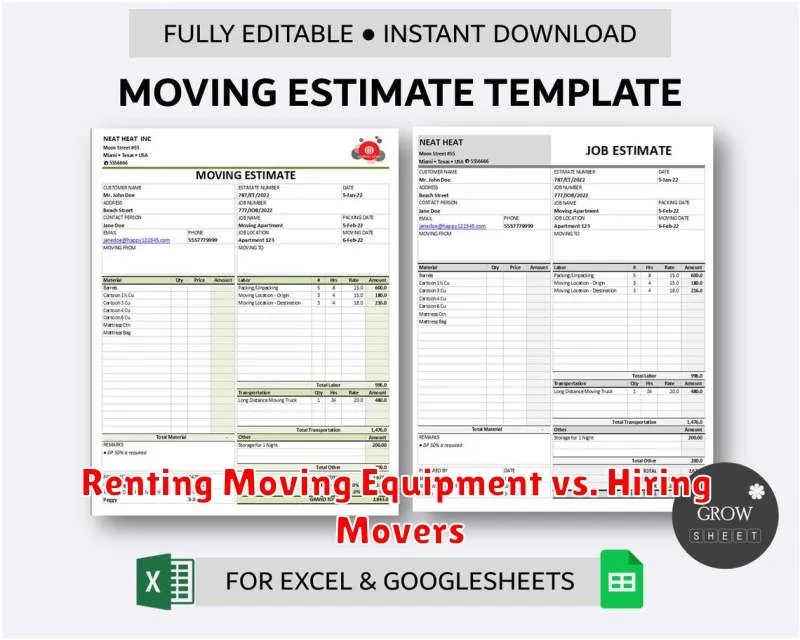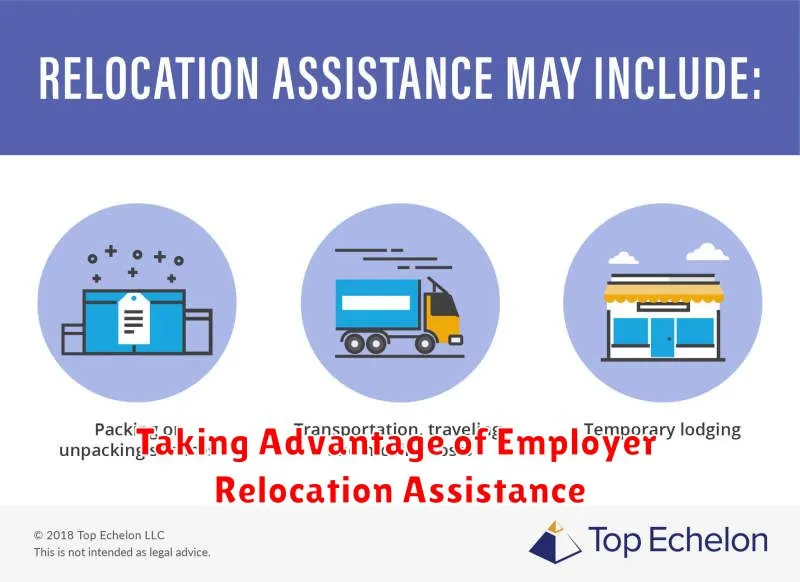Are you moving soon? The thought of packing up your life and moving to a new apartment can be both exciting and overwhelming. One of the biggest concerns for most renters is the cost of moving. Moving expenses can quickly add up, from hiring movers to renting a truck to packing materials. But don’t despair! There are plenty of ways to save money on moving expenses without sacrificing quality or convenience. This article will provide you with tips and tricks to help you minimize your moving costs and keep more money in your pocket. From packing smart to utilizing free resources, we’ll cover everything you need to know to make your move as affordable as possible. So, buckle up and let’s get started on your cost-effective move!
Creating a Moving Budget
Moving can be a costly affair, especially for apartment renters. Before you start packing, it’s crucial to create a moving budget. This will help you stay on track with your finances and prevent overspending.
Start by listing all the potential moving expenses, such as:
- Packing materials (boxes, tape, bubble wrap, etc.)
- Moving truck rental or hiring movers
- Cleaning supplies for your old apartment
- Security deposit for your new apartment
- First month’s rent and utilities
- Travel expenses (gas, tolls, parking)
- Food and drinks during the move
Next, research the cost of each item and factor in any unexpected expenses. Be realistic and allocate enough funds for contingencies. Once you have a comprehensive list of expenses, calculate the total cost and determine how much you need to save.
Consider using a spreadsheet or budgeting app to track your expenses and progress. This will help you stay organized and ensure that you’re sticking to your budget. By creating a thorough moving budget, you can plan your move effectively and avoid any financial surprises.
Finding Affordable Moving Services

Moving can be expensive, especially for apartment renters. However, there are ways to save money on moving expenses, and finding affordable moving services is a great place to start. Here are a few tips:
Get quotes from multiple companies: Don’t settle for the first quote you get. Compare prices from several moving companies before making a decision. Be sure to ask about any additional fees, such as packing and unpacking services, and get everything in writing.
Consider a moving truck rental: If you’re moving a short distance, renting a moving truck could be a cheaper option than hiring a full-service moving company. You’ll need to do the packing and loading yourself, but you can save a lot of money.
Hire movers for specific tasks: You don’t have to hire movers for everything. If you’re comfortable packing your own belongings, you can hire movers to just handle the heavy lifting. This can be a more affordable way to get help with your move.
Ask friends or family for help: If you’re moving a short distance, you may be able to get help from friends or family members. This is a great way to save money and have some fun with your move.
Use online resources: There are a number of online resources that can help you find affordable moving services. These resources can provide you with quotes from multiple companies, as well as tips on how to save money on your move.
By following these tips, you can find affordable moving services that will help you save money on your move.
Packing Tips to Save Money
Moving can be a stressful and expensive experience, but with some smart planning and packing strategies, you can save a significant amount of money. Here are a few tips to help you pack like a pro and save money on your moving expenses:
Start Early & Declutter
One of the best ways to save money on moving is to declutter your belongings before you start packing. Sell, donate, or throw away items you no longer need. The less you have to pack, the less you’ll have to pay for boxes, moving supplies, and potentially even the moving truck.
Utilize Free Packing Materials
Don’t be afraid to ask for free packing materials. Many businesses, including grocery stores, liquor stores, and online retailers, will happily give away their used boxes. You can also check online marketplaces like Craigslist or Facebook Marketplace for free boxes.
Choose the Right Boxes
Not all boxes are created equal. Consider the size and weight of the items you’re packing and choose boxes accordingly. Use smaller boxes for heavy items and larger boxes for lighter items. This will help prevent the boxes from becoming too heavy to lift and potentially breaking.
Pack Smart & Strategically
Pack items in a way that minimizes wasted space. Use packing paper, bubble wrap, or old towels to cushion fragile items. Fill empty spaces in boxes with clothing, linens, or pillows to prevent shifting and damage. When packing dishes, use packing paper or bubble wrap between each plate and stack them vertically. You can even use your clothes as packing material, saving on the cost of bubble wrap or packing peanuts.
Don’t Forget the Essentials
Pack a “first night” box with everything you’ll need for the first evening in your new place. This should include essential toiletries, a change of clothes, snacks, and any medications you need. This way, you don’t have to unpack everything right away.
DIY Moving Strategies
Moving can be a stressful and expensive undertaking, especially for apartment renters. However, with some clever DIY strategies, you can significantly reduce your moving expenses. Here are some tips to save money on your next move:
1. Declutter and Donate: Before packing, take inventory of your belongings and get rid of anything you don’t need or use. This reduces the amount you have to move, saving on packing supplies, transportation, and storage costs. Donate unwanted items to charity for a tax deduction.
2. Pack Smartly: Use free or inexpensive packing materials. Collect boxes from grocery stores, liquor stores, or online retailers. Utilize old newspapers, towels, and blankets for cushioning. Consider using reusable totes and suitcases instead of traditional cardboard boxes.
3. Recruit Help: Enlist friends and family to help with packing, loading, and unloading. Offer snacks and drinks as a thank you. If you can’t find enough volunteers, consider hiring a moving crew for only the loading and unloading, which can be cheaper than hiring a full-service moving company.
4. Utilize Your Vehicle: If you have a car or truck, you can save money by transporting some of your belongings yourself. If your car is too small, rent a truck or van for a day or two. Be sure to factor in gas, tolls, and parking fees when calculating your costs.
5. Consider a Moving Company Alternative: Explore services like U-Haul and PODS, which offer self-service moving options at a lower price than traditional moving companies. They provide storage containers and transportation, allowing you to pack and load at your own pace.
Utilizing Free Moving Resources
Moving can be a costly endeavor, especially for apartment renters. Fortunately, there are ways to save money on moving expenses by utilizing free resources. Here are a few ideas to consider:
Friends and family: Enlisting the help of friends and family can save you money on labor costs. Offer to provide food and drinks to show your appreciation. You can also consider asking your friends if they have any boxes or packing materials you can use.
Online marketplaces: Websites such as Craigslist, Facebook Marketplace, and Nextdoor are great places to find free boxes and moving supplies. You can also post a request for assistance with your move if you need help loading or unloading your belongings.
Donation centers: Many donation centers will accept unwanted items and will also provide free boxes for your donations. This can save you money on both packing materials and the cost of hauling away items you no longer need.
Community resources: Some communities offer free moving services for low-income residents or seniors. Check with your local community center or senior center to see what resources are available in your area.
Apartment complexes: Some apartment complexes offer free moving services or discounts on moving trucks. Check with your current and future apartment complexes to see what benefits are available.
Utilize free moving resources to significantly reduce the cost of your next move!
Saving Money on Packing Supplies
Packing supplies can be a major expense when moving. You might be tempted to buy everything you need at a big box store, but you can save a lot of money by getting creative and shopping around. Here are a few tips for saving money on packing supplies:
Ask friends and family if they have any boxes they are willing to part with. Many people have boxes left over from their own moves. You can also ask local businesses if they have any leftover boxes.
Look for free boxes at grocery stores and liquor stores. Many stores will give away boxes to anyone who asks.
Check online marketplaces like Craigslist or Facebook Marketplace. You can often find people selling used packing supplies at a fraction of the price of new supplies.
Get creative with your packing materials. You don’t need to buy expensive packing peanuts. Use newspaper, towels, and other soft items to protect your belongings.
Consider using reusable packing materials. There are a number of reusable packing materials available, including reusable boxes and packing peanuts. These materials can save you money in the long run, and they are also better for the environment.
By following these tips, you can save a significant amount of money on packing supplies for your next move.
Moving During the Off-Season
Moving during the off-season is a great way to save money on your moving expenses. This is because you’ll be competing with fewer people for movers, trucks, and storage units, which means you can get better deals.
The off-season for moving typically runs from September to April. This is because most people move during the summer months, when the weather is good and kids are out of school.
By moving during the off-season, you can take advantage of the following:
- Lower moving rates: Moving companies typically offer discounts during the off-season.
- More availability: You’ll have more options when it comes to movers, trucks, and storage units.
- Less competition: You’ll be competing with fewer people for these services, which means you can negotiate better prices.
Of course, there are some downsides to moving during the off-season. For example, you may have to move during bad weather, and you may not be able to find a mover on short notice. However, if you’re willing to plan ahead and be flexible, you can save a lot of money by moving during the off-season.
Negotiating Moving Costs
Moving can be expensive, but there are ways to save money on moving expenses. One way is to negotiate moving costs with your new landlord or property manager. This may seem daunting, but it is often possible to negotiate a lower moving fee or even have the moving costs waived altogether.
Here are a few tips for negotiating moving costs:
- Be upfront about your budget. Let your landlord know that you are looking for an apartment that fits within a certain price range, and that moving costs are a significant factor in your decision.
- Be flexible with your move-in date. If you are willing to move in on a date that is less desirable for the landlord, they may be more likely to negotiate on moving costs.
- Highlight your strengths as a tenant. Let your landlord know about your good credit history, stable employment, and commitment to being a responsible tenant.
- Be prepared to walk away. If the landlord is not willing to negotiate, you may need to consider another apartment. It’s important to remember that you have options.
By following these tips, you can increase your chances of negotiating moving costs and saving money on your next move.
Downsizing for a Cheaper Move
Moving can be an expensive undertaking, especially for apartment renters. One way to significantly reduce your moving costs is by downsizing your belongings. When you have less to move, you’ll need a smaller moving truck, and you’ll have fewer items to pack and unpack. It’s a win-win situation!
To downsize effectively, start by decluttering your home. Go through each room and decide what you truly need and what you can live without. You can sell unwanted items online, donate them to charity, or even throw them away. Remember, the less you have, the less you have to pack and move. Be ruthless!
Downsizing can also include getting rid of larger pieces of furniture or appliances. You may be able to sell these items or donate them to organizations that accept them. This is a great opportunity to upgrade to more space-saving furniture or appliances. If you are moving to a smaller apartment, this is a great opportunity to declutter and downsize!
The key to downsizing is to be realistic about your needs and to create a minimalist lifestyle. This will not only save you money on your move but also simplify your life in the long run. Moving to a new apartment should be a fresh start, and minimizing your belongings can help make that happen!
Renting Moving Equipment vs. Hiring Movers

Moving can be a stressful and expensive process, but it doesn’t have to break the bank. For apartment renters, one of the biggest expenses is often the moving itself. You have the option of renting moving equipment or hiring movers, and both come with their own pros and cons. Ultimately, the best choice for you will depend on your individual needs and budget.
Renting moving equipment is a great option for those who are physically able to move their own belongings and want to save money. You can rent trucks, dollies, and other equipment from companies like U-Haul or Penske. This gives you the freedom to pack and load at your own pace, and you can often get a discount if you reserve your equipment in advance.
However, renting moving equipment also has some downsides. You’ll need to be prepared to do all the heavy lifting yourself, and you’ll be responsible for transporting the equipment to and from your old and new apartments. You’ll also need to factor in the cost of gas, insurance, and potential damage to the equipment.
Hiring movers is a more expensive option, but it can be worth it if you have a lot of heavy furniture or if you’re short on time. Professional movers will handle all the packing, loading, unloading, and transporting of your belongings, and they’ll be insured in case of any damage. You’ll be able to relax and focus on other aspects of the move.
However, hiring movers can be costly. You’ll need to get quotes from multiple companies to compare prices, and you should be aware of any additional fees that may apply. Be sure to ask about the movers’ experience, insurance, and whether they provide packing materials.
When deciding between renting moving equipment and hiring movers, it’s important to weigh the pros and cons of each option and consider your individual circumstances. If you’re on a tight budget, renting equipment can save you money. But if you’re short on time or you have a lot of heavy furniture, hiring movers may be the better choice.
Taking Advantage of Employer Relocation Assistance

Relocating for a new job can be exciting, but the associated expenses can be daunting, especially for apartment renters. Fortunately, many employers offer relocation assistance packages to ease the transition for their new hires. Taking advantage of these benefits can significantly reduce your out-of-pocket costs and make the move more manageable.
Relocation assistance programs vary depending on the employer, but they typically cover a range of expenses, including:
- Moving expenses: This can include the cost of hiring professional movers, transporting your belongings, and packing materials.
- Temporary housing: Many employers provide temporary housing options during the initial transition period, helping you find a permanent residence.
- Travel expenses: This can cover the cost of flights, train tickets, or driving expenses to your new city.
- Home sale assistance: Some employers may offer assistance with selling your previous home.
- Closing costs: Relocation assistance may cover some closing costs associated with purchasing a new home.
To maximize the benefits of relocation assistance, it’s crucial to understand the terms and conditions of your employer’s program. Carefully review the details of the package, including eligible expenses, reimbursement limits, and any required documentation.
Proactively communicating with your employer’s HR department regarding your relocation needs will ensure a smooth and cost-effective transition.

